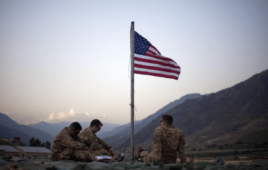
Qatar’s Mediation Challenges in the Afghan Peace Process
As NATO’s 20-year campaign in Afghanistan comes to an end and the Taliban escalate their nationwide offensive, Qatar remains the most privileged actor among the Persian Gulf States. This comes as a result of Qatar’s mediation efforts in listening to the different actors involved in the Afghan conflict and the considerable trust earned throughout the past few years.
In spite of Qatar’s long experience as a mediator in disputes and wars, the Gulf country has some challenges and responsibilities to face, in terms of regional and international stability and peace.
Background
Although Qatar did not recognize the Taliban between 1996 and 2001, it maintained “cordial” relations with the group after 9/11. The decision to open a political office hosting Taliban leaders in Doha in 2013, was a major step for the Afghan peace negotiations. Initially, the Afghan government expressed its willingness to provide protection for the Taliban leaders by opening a political office in Saudi Arabia or Turkey. This was largely based on the countries’ historic ties with Kabul. However, the Taliban expressed their preferences over Qatar, which was believed to be a more impartial and balanced power.
In September 2020, peace talks between the Taliban and the Afghan government took place in Doha. In spite of this, an acute rise in civilian casualties followed. According to OHCHR data, October 2020 marked the highest monthly number of civilian casualties of the year, “with targeted killings of civilians […] included media workers, civil society activists, members of the judiciary and the government administration, as well as relatives of members of the security forces”.
On 17th and 18th of July 2021, peace talks were held in Doha between the Taliban and the Afghan government. However, the Qatari facilitator stated that the two sides had only agreed to “work to prevent civilian casualties”. Despite this, both sides committed to expediting peace negotiations in Doha in the upcoming weeks.
Qatar challenges and potentiality in the peace process
Qatar is known as a power capable of exerting its regional and international influence through the mediation tool. Since 2008, the Gulf country has mediated in more than 10 international disputes. Among them, it is worth mentioning, the Qatari mediation between Fatah and Hamas in 2012, as well as the reconciliation and peace between the rival Tebu and Tuareg tribes in Libya in 2015.
Qatar could also mediate to counterbalance Iran and Saudi Arabia’s regional and ideological tensions and goals in Afghanistan. This could be achieved by highlighting the commitment and efforts to bring peace, reconstruction, and protection of human rights.
However, Qatar will also have to face difficulties. Qatar has lately been approached by NATO concerning the possible use of a base in Qatar, to secure and train the Afghan special forces, following the total withdrawal of US-led troops from Afghanistan scheduled on September 11, 2021. If Qatar accepts NATO’s offer, it will become a strategic channel between Afghanistan and NATO countries. Nevertheless, this could result in the deterioration of Qatar’s ties with the Taliban, who may interpret the move as an attempt to support the Afghan government.
Conclusion
The Gulf country needs to reflect on NATO’s offer. Depending on the result, geopolitical consequences and changes will be inevitable in the Afghan peace process. However, it is relevant to take into consideration the regional and international commitment to empowering the Afghan population and securing sustainable and long-term peace.



